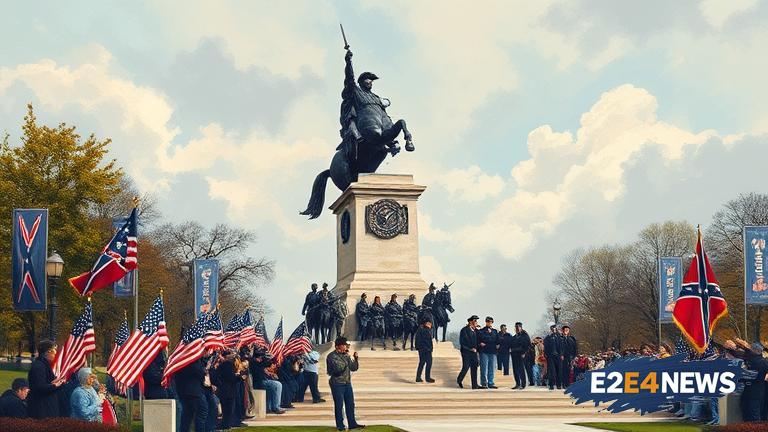The Trump administration’s decision to reinstall a Confederate statue that was toppled by protesters has sparked widespread controversy and debate across the United States. The statue, which was erected in honor of a Confederate general, was pulled down by demonstrators during a wave of protests against racial inequality and police brutality. The Trump administration has argued that the statue is a part of the country’s history and cultural heritage, and that its removal was an attempt to erase the past. However, critics have countered that the statue is a symbol of white supremacy and racism, and that its reinstatement is a slap in the face to the African American community. The controversy has highlighted the deep divisions within the US, with many arguing that the country needs to confront its troubled past and work towards a more inclusive and equitable future. The decision to reinstall the statue has been met with widespread criticism from civil rights groups, who argue that it is a step backwards for the country. The NAACP has condemned the decision, stating that it is a clear example of the Trump administration’s disregard for the rights and dignity of African Americans. The ACLU has also spoken out against the decision, arguing that it is a violation of the First Amendment rights of protesters who toppled the statue. The controversy has also sparked a wider debate about the role of Confederate monuments in the US, with many arguing that they are a reminder of the country’s history of slavery and racism. Some have argued that the monuments should be removed and replaced with new ones that reflect the country’s diverse history and cultural heritage. Others have argued that the monuments should be left in place, but with additional context and information that provides a more nuanced understanding of the country’s past. The Trump administration’s decision to reinstall the statue has been seen as a victory for those who argue that the monuments should be preserved, but it has also sparked fears that it will embolden white supremacist groups and perpetuate racism. The controversy has highlighted the need for a more nuanced and informed discussion about the country’s history and cultural heritage, and the role that Confederate monuments play in it. It has also sparked calls for greater education and awareness about the country’s past, and the need for a more inclusive and equitable society. The decision to reinstall the statue has been met with widespread criticism from historians and academics, who argue that it is a distortion of the country’s history and a perpetuation of racist ideologies. The controversy has also sparked a wider debate about the role of the federal government in preserving and promoting the country’s cultural heritage, and the need for a more nuanced and informed approach to the issue. The Trump administration’s decision to reinstall the statue has been seen as a clear example of the government’s disregard for the rights and dignity of African Americans, and its willingness to perpetuate racist ideologies. The controversy has highlighted the need for a more inclusive and equitable society, and the need for greater education and awareness about the country’s past. It has also sparked calls for greater action to address the systemic inequalities and injustices that persist in the US, and the need for a more nuanced and informed approach to the issue. The decision to reinstall the statue has been met with widespread criticism from international observers, who argue that it is a clear example of the US’s failure to confront its troubled past and work towards a more inclusive and equitable future. The controversy has highlighted the need for a more nuanced and informed discussion about the country’s history and cultural heritage, and the role that Confederate monuments play in it. It has also sparked calls for greater education and awareness about the country’s past, and the need for a more inclusive and equitable society. The Trump administration’s decision to reinstall the statue has been seen as a step backwards for the country, and a clear example of the government’s disregard for the rights and dignity of African Americans. The controversy has highlighted the need for a more inclusive and equitable society, and the need for greater education and awareness about the country’s past. It has also sparked calls for greater action to address the systemic inequalities and injustices that persist in the US, and the need for a more nuanced and informed approach to the issue.





